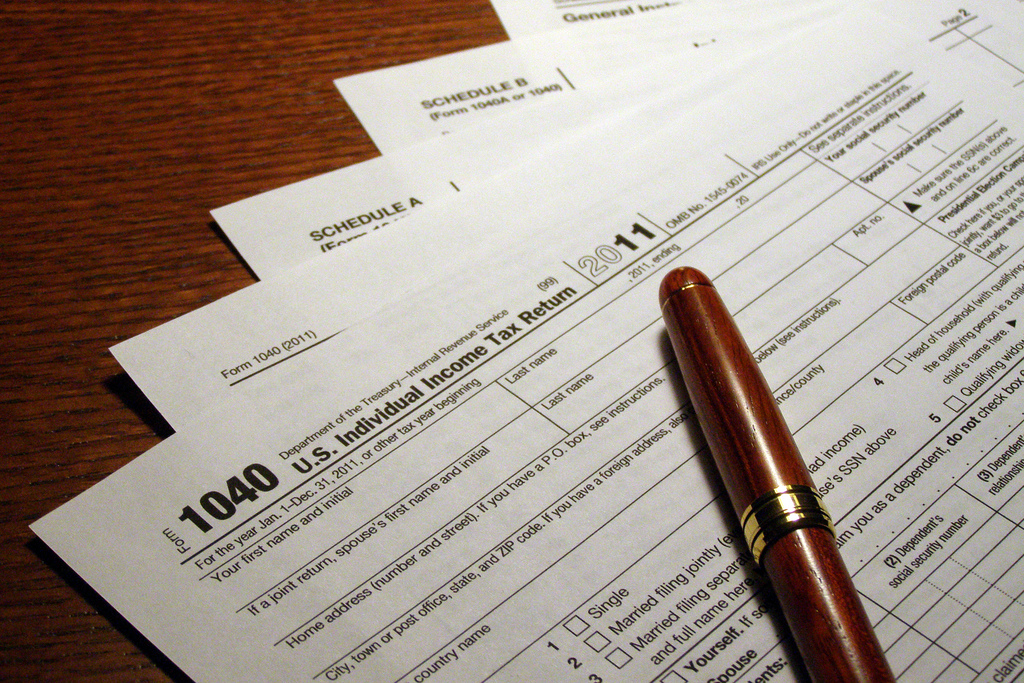 Photo from Flickr/ccPixs.com.
Photo from Flickr/ccPixs.com. Presidents Calvin Coolidge, John F. Kennedy, Ronald Reagan and George Bush (43) all organized major tax cuts that generated significant economic growth.
Donald Trump has staked his presidency on gross domestic product rates far above President Barack Obama’s years (1.5 percent per year). He badly needs a political victory, and the GOP needs something to show for its majority, heading into 2018.
“On the one hand,” as economists say, the Trump tax plan is overdue. Lowering corporate tax rates from 35 percent to 20 percent will make U.S. business more competitive with Canada, Europe and Asia. Apple and other large enterprises will repatriate some of the $3 trillion held offshore, creating jobs and raising employee wages.
Economist Larry Lindsey predicts that lower corporate taxes and deregulation will increase productivity, capital formation, new business startups and employee education and re-training, though growing corporate earnings have already pushed the Dow Jones industrial average, the Standard & Poor’s 500 index and the NASDAQ composite to all-time highs.
“On the other hand,” keeping popular tax deductions for home mortgage interest and charitable giving risks growing our national debt if promised economic growth does not materialize.
To generate revenue, then, the president advocates ending the federal deduction of state and local taxes. Democrats argue this is an unfortunate, partisan shot at taxpayers in high-tax states like California, New York, New Jersey and Illinois. They are correct.
Some Republicans wrongly argue that blue states are subsidized by more fiscally prudent red states. But California is a net donor state, bearing the burden of one-third of the entire nation’s welfare cases, plus other costs associated with federal failure on illegal immigration.
The GOP tax plan, then, unfortunately favors corporate lobbyists and the super wealthy, the top 1 percent of the 1 percent, the Manhattan hedge fund billionaires and Silicon Valley masters of the universe. These are not mostly Republicans, by the way, nor part of the Trump electoral coalition.
A wealth tax on the top 1 percent — the high-income earners who pay some 40 percent of all federal income taxes; as well as the top 10 percent — who pay some 70 percent of all federal income taxes — would ungenerously label as “rich” those taxpayers who already pay way more than their fair share, due to progressive tax rates that punish striving, sacrifice and success, and discourage investment, saving, hard work and self-reliance.
Taxes are about incentives. The late economist Milton Friedman taught that what we tax, we get less of. As he said, “We need not more taxes, but more taxpayers.”
The GOP effort to reduce the tax rate on the middle class is popular, as is the rejection of a border adjustment tax, which would disfavor importers, retailers and consumers.
Simplifying the tax code may save individual taxpayers time and costs preparing annual federal returns. Ending the complex alternative minimum tax (AMT) tax and the federal estate tax are good ideas, too.
Perhaps it’s time for the flat tax — real individual tax reform and simplification — or a consumption tax, which raises revenue without disproportionately hurting the working poor.
Perhaps it’s time for the flat tax.
Half of our citizens with low income now don’t pay any federal income tax, (although they do pay federal payroll, Social Security and Medicare taxes). Perhaps low-income workers should bear the responsibility of even small income taxes, too.
Joseph Isaac Lifshitz’s careful study of the biblical and rabbinic corpus, “Judaism, Law and the Free Market” offers instruction from talmudic tractate Berakhot: “One who benefits from his own labor is greater than one who fears heaven.” And from Pesahim, in a teaching of Rabbi Akiva to his son: “It is better to make your Sabbath meals ordinary than to become dependent on others.”
Albert Einstein asserted that the tax code was purposely confusing: “This is too difficult for a mathematician. It takes a philosopher.”
Former Chief Justice John Marshall noted that: “The power to tax is the power to destroy,” while Benjamin Franklin warned: “It would be a hard government that took even one-tenth of a people’s income.”
Like death, taxes are certain. Current proposals to offer some relief for hardworking citizens make good public policy.
Larry Greenfield is a fellow of The Claremont Institute and a wealth advisor in Los Angeles.






















 More news and opinions than at a Shabbat dinner, right in your inbox.
More news and opinions than at a Shabbat dinner, right in your inbox.